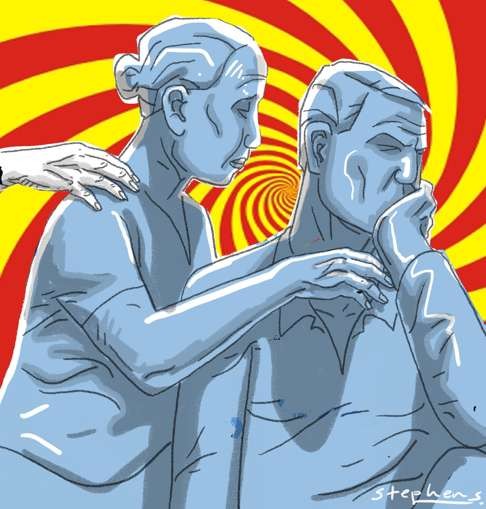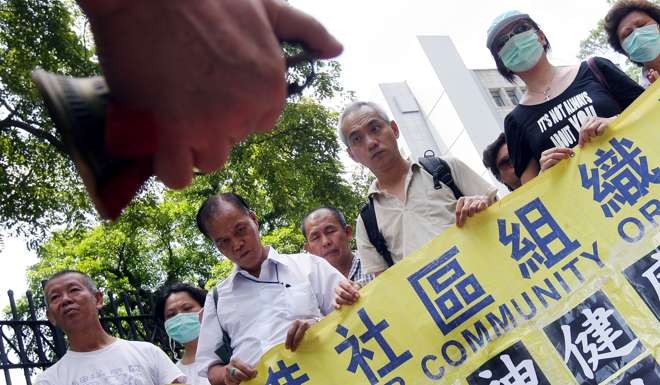
Carers of those suffering from mental illness in Hong Kong need our support, too
Samson Tse offers three key policy suggestions to help ensure family support is an integral part of tackling mental health issues in society


In Hong Kong, a citywide study, the Hong Kong Mental Morbidity Survey, was conducted between 2010 and 2013. Of the 5,710 adults aged 16-75 surveyed, more than 13 per cent were estimated to be suffering from common mental disorders, such as depression and anxiety disorders, in the previous week. Among those affected, only 26 per cent had sought help from mental health services during the previous year, and those who had not were likely to be men with low educational attainment.
Untreated conditions often exacerbate over time, resulting in the situation being more difficult to manage, inflicting a heavy burden on the person affected in addition to their family and caregivers.
Due to the global trend of the deinstitutionalisation of those suffering from mental health disorders in the past five decades, families have inevitably assumed an active role as caregivers for individuals living with such conditions. This is especially the case for Chinese, who greatly value close family ties.

One local study on first-episode psychosis reported that more than 50 per cent of people with schizophrenia are either living with or receiving care and assistance from their families.
It is not inconceivable that for every person living with a mental illness, two or three others (for example, family members, friends or colleagues) are affected indirectly by the condition, which is about 40 per cent of the Hong Kong population.
It is not inconceivable that for every person living with a mental illness, two or three others ... are affected indirectly by the condition
Caregiving is not without its burdens and challenges. Burdens can include difficulties such as disruptions to family relations, loss of family income, changes in household routine, navigating the mental health system, limited access to needed services and stigmatisation.
Emotional distress, anger, depression, low self-esteem, lack of confidence, embarrassment, worry and tension that arise during the caring process are common among family caregivers.
These burdens may also affect caregivers’ ability to perform a caring role, which would in turn impede the recovery of their family members and is further compounded by a lack of support in the community.
A study led by Professor Daniel Wong of City University reported that almost 70 per cent of individuals in Hong Kong who care for relatives with a mental illness were not able to access support from mental health services and friends, while almost half of them did not receive any support from family members.
Caring for a family member living with a mental illness is a unique and transformative experience that can bring the members closer together, build a stronger family, encourage empathy and promote personal growth. In order to support caregivers under the growing scale of mental health issues, I would like to make three key policy and service suggestions.
First, one internationally recognised approach for supporting caregivers is a peer-to-peer model in which caregivers become a means of formal (paid) or informal support in caring for other caregivers after training.
Caring for a family member living with a mental illness is a unique and transformative experience
The approach focuses on the provision of emotional support (for instance, alleviating worry, anxiety and rumination) and informational support (for example, the treatment options available and strategies to negotiate better services); and the fostering of positive attitudes toward engagement in mental health services. The aim is to increase caregivers’ sense of empowerment and self-efficacy with regard to supporting their family members’ recovery process.
The emerging evidence suggests that family peer-to-peer interventions are associated with improvements in family functioning, social connectedness and better understanding of the condition and relevant services available. Presently, this idea is being taken up by a few local non-governmental organisations.
Second, during some recent teaching at university, I met a group of frontline medical staff who shared their experience of the reality of their everyday practice. They were told to support family members but it has largely been a token offering, as they simply do not have enough time and the relevant training to attend to the families’ needs. Family support should be an integral part of the curriculum of our modern mental health workforce.

Overseas scholars have proposed a three-stage approach for caregivers of all newly diagnosed cases, with each stage including the following for the caregiver:
Stage 1: two educational sessions to encourage initial ventilation of feelings and provide basic information about the mental health system and the support services available.
Stage 2: three to four structured, interactive sessions facilitated by family work professionals to assist an individual family in problem-solving specific issues, whether it be adherence to treatment, strained family relationships or substance abuse.
Stage 3: this involves 12-15 theory-based sessions for those who are interested in learning how to deal with chronic problems.
Welfare and hospital services should put in place other support mechanisms such as a caregivers’ information hub
Third, the government has recently announced a two-year pilot scheme that aims to provide caregivers of individuals with disabilities from low-income families with a living allowance of HK$2,000. This scheme is definitely a step in the right direction, though some challenges remain.
First, welfare agencies need to promote the scheme to the general public, in particular to elderly caregivers. Second, in addition to financial support, welfare and hospital services should put in place other support mechanisms such as a caregivers’ information hub in each hospital and community centre, to create a bigger impact.
Third, part of the review of the pilot scheme should examine the eligibility criteria for participation in the scheme to ensure it does not miss out a significant portion of the population that is really in need of the subsidies.
In addition to having good medical care for people with mental illness, we need to adopt a more recovery-oriented approach that instils hope, emphasises the importance of an individual’s personal goals and focuses on improving family and social support outside the mental health system.
October 10 is World Mental Health Day. Let us remember people living with mental health concerns, caregivers and the professionals working in the field.
Samson Tse is professor and convenor of the Mental Health and Social Policy Research Group in the Faulty of Social Sciences at the University of Hong Kong